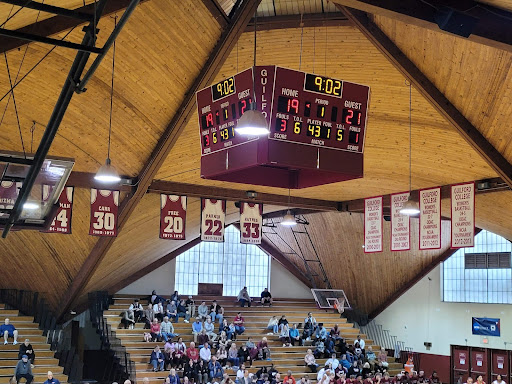NCAA continues to avoid NC due to HB2
The North Carolina General Assembly has voted to repeal House Bill 2, North Carolina’s controversial “bathroom bill” originally passed in April 2016, which has faced longstanding opposition nationwide, notably from the National Collegiate Athletic Association.
Last week, the NCAA released an official statement warning that if the bill was not repealed, the organization would not consider North Carolina as a host for any neutral-site tournaments from 2018-2022.
“I’d be really surprised to hear the legislature say that (the repeal) was not prompted in part by the NCAA’s decision,” said Assistant Athletic Director and Sports Information Director Dave Walters.
With the revocation of House Bill 2 came the passage of House Bill 142, a piece of legislation that freezes the ability of local governments to create ordinances that regulate private employment practices or public accommodations until 2020.
The NCAA has yet to state whether or not they will once again consider North Carolina to host tournaments.
“This is a very dynamic, fluid, changing situation,” Walters said. “We don’t know how the NCAA will rule next week.”
The NCAA decision will have a long-lasting financial impact on the state. The North Carolina Sports Association stated in a letter to the General Assembly that the removal of tournaments for five years could cost the state upwards of $250 million.
“It’s a significant amount of money,” said Bob Williams, professor of economics at Guilford. “It would be the hotel and restaurant and all of that entertainment business that would be (impacted).”
These industries have already been impacted by HB2. Companies such as PayPal have removed plans for future facilities and musicians including Ringo Starr and Bruce Springsteen have canceled concerts over the bill.
The NCAA has penalized North Carolina for the bill over the past year already.
“They played the tournament game last week in South Carolina because it had been moved from Greensboro,” said Williams. “And what’s ironic about that is for years, the NCAA didn’t play games in South Carolina because of the Confederate flag in the state capitol.”
With South Carolina’s hosting history in mind, Walters believes that the NCAA considers political involvement to be an effective tactic.
“This idea of taking a stand against North Carolina and this particular legislation is not new to the NCAA,” said Walters. “It appears to be a tactic that it really stands by and feels strongly about.”
Student perspective on the NCAA boycott is mixed, with some believing that the removal of tournaments is just and some believing it goes too far.
“I feel it’s well within their rights and it’s definitely getting attention from people,” said Jared Willis, a senior and political science and international studies major at Guilford. “Definitely for me, (HB2) kinda seems like a bit of an embarrassment.”
First-year biology major Mils Eisenberg has a different point of view.
“I understand what they’re doing, but … it’s also penalizing the people who didn’t have anything to do with it,” said Eisenberg. “I think they should issue a statement and maybe do other things, but I just don’t think that they should get this involved politically.”
Walters offers a new perspective on the NCAA’s actions.
“The NCAA is made up of individual institutions of higher learning,” said Walters. “I would suggest that if you hold the general sense among NCAA member institutions that those institutions would probably be in favor of some kind of ban (against N orth Carolina).
“I believe it is reflecting probably the will of its members.”
No matter the future decisions made by the NCAA regarding tournaments in North Carolina, the NCAA’s stance on House Bill 2 has been made clear.









